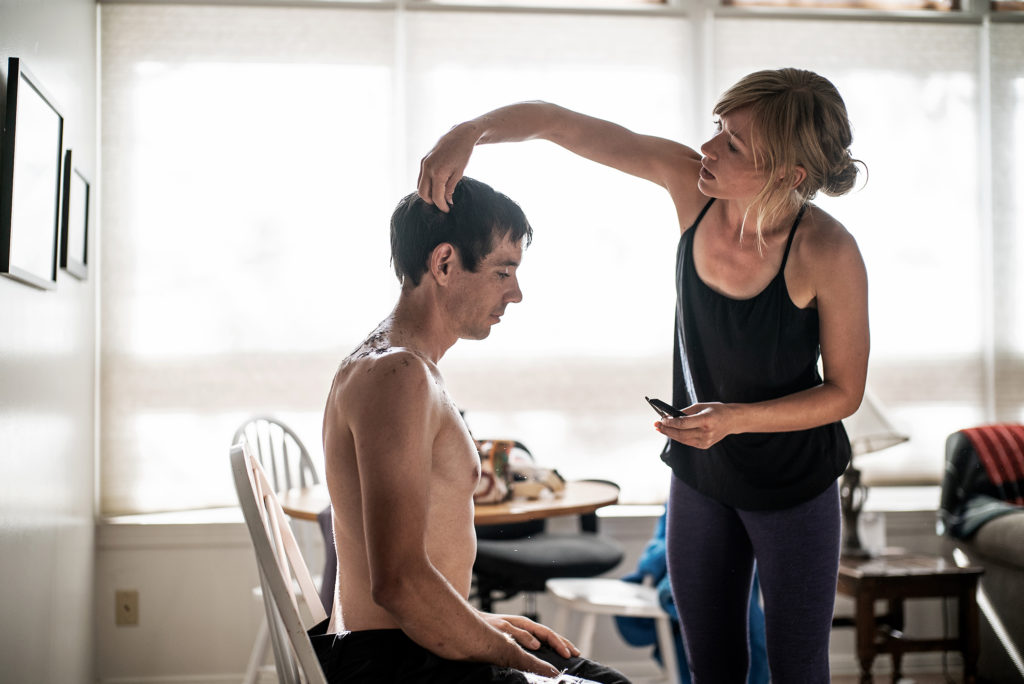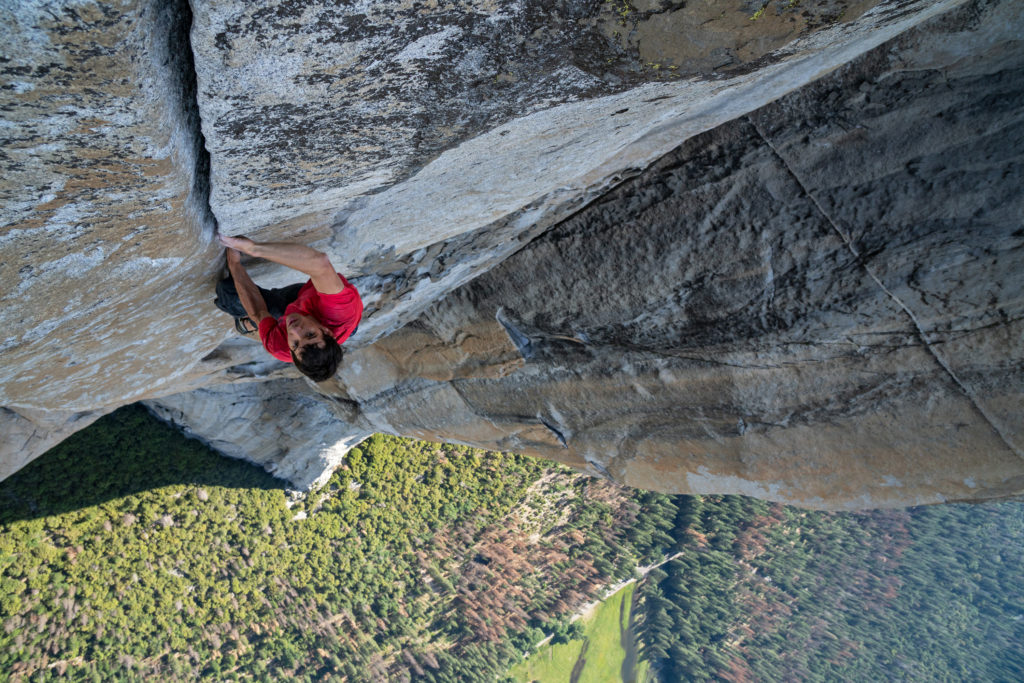Someone loves you — in a romantic way — and you love that person in return. Do you have an obligation to try to stay alive as long as possible because it would be painful for your partner if you die?
That’s an issue brought up in Free Solo, a new documentary about Alex Honnold, who made the first free-solo ascent (meaning with no ropes or safety equipment) of Yosemite’s El Capitan — 3,200 feet of sheer granite — in 2017. That’s intriguing enough, but the documentary also had a surprisingly strong romantic angle to it; after directors Elizabeth Chai Vasarhelyi and Jimmy Chin began filming Honnold, he met and became romantically involved with Sanni McCandless, an avid outdoorswoman but less-accomplished climber. And their romance tweaks his story, leading to headlines proclaiming “In ‘Free Solo,’ Alex Honnold is on display as climber and boyfriend” and “In ‘Free Solo,’ Love Proves A Steeper Challenge for Honnold Than El Cap.”
 It also leads Chin, his longtime friend and fellow climber, to marvel at Honnold saying, “I love you” to his girlfriend after reaching the top of El Cap.
It also leads Chin, his longtime friend and fellow climber, to marvel at Honnold saying, “I love you” to his girlfriend after reaching the top of El Cap.
“In the 10 years I’ve known Alex, I’ve certainly never heard him say ‘I love you’ to anybody,” Chin says. “So when we saw the footage, I was like, ‘He said what?’ I couldn’t believe it.”
Putting romantic love on the same pedestal as his insanely monumental climbing feat? Interesting.
The pressures of love
Early on, Honnold declares he “will always choose climbing over a lady.”
“Nobody achieves anything great by being happy and cozy,” he says. But then McCandless moves into the spartan van he’s called home for nearly a decade, and gets happy and cozy with him. Then he wonders if their relationship obligates him to stay alive. It doesn’t, he decides: “I in no way feel obligated to maximize lifetime.” She, obviously, feels differently.
But that is indeed an intriguing question: Should we be doing everything we possibly can to have a long, healthy life so our beloved won’t have to suffer and mourn our early demise? Should we do that even if it means we have to give up living our most authentic life?
Honnold, 33, is clear — all of us are going to die at some point, and none of us know exactly when that might take place. And that’s true, although let’s face it, climbing insanely steep mountains without safety gear ups the ante.
McCandless, 26, is just as clear — why not have both, she says:
I mean, imagine you’re waking up to take on the most challenging physical experience of your life. If you wake up alone in a cold, dark van, you’re like, ‘I’ve gotta get out there and ascend and be rad!’ If you wake up next to a partner and you’re cozy, you’re happy — why go? Why put your life at risk? I think in a lot of ways my role was to say over and over again: ‘I think you can have it all. I think you can be in this relationship and have a lot of joy and love in your life and you can also go do rad things and you can also go be a badass athlete.”
 Even the directors questioned his blossoming romance. “To fall in love with Sanni in front of the cameras while you’re working on the biggest dream of your life while this big production is around you — it was a lot,” Vasarhelyi says.
Even the directors questioned his blossoming romance. “To fall in love with Sanni in front of the cameras while you’re working on the biggest dream of your life while this big production is around you — it was a lot,” Vasarhelyi says.
A desire for ‘normal’
And the viewers can see how “a lot” it was, especially for McCandless. She’s his cheerleader and puts a happy spin on everything, but you can sense that she’s hoping he’ll be just as happy at some point to settle into a more “normal” life. They move toward that by abandoning the van for a home in Las Vegas, where there’s good climbing nearby. She admits on camera tearfully that she struggles to understand why he wants to do what he does, even though that’s the man she fell in love with. She also knows she can’t, and wouldn’t, stop him — he’ll regret it, and most likely resent her. Still, she wonders, “What if I don’t see him again?”
He gets injured in some of his prep climbs while they’re together. Maybe he blames her. “Alex and I had all those conversations. I was very much committed to learning: What did I do wrong? Could I have done something differently? How am I affecting you, and how are you affecting me?” she wonders.
Oh, honey …
Facing danger
Watching the film reminded me of McConkey, a 2013 documentary on the life and death of freeskiing pioneer Shane McConkey, who died at age 39 after something went wrong in a jump in Italy’s Dolomites in 2009, leaving behind a wife and a 3-year-old daughter.
Should he have stopped his death-defying career, which gave him and his family a good life? His widow, Sherry, says no: “He was an amazing husband and an amazing father and just a normal human being as well as an innovator of various sports.” There are lots of careers that are dangerous — from firefighting to police work to the military. Do we judge men and women for pursuing dangerous careers that we consider a little more frivolous, such as free soloing and freeskiing? Do we judge them more if they have a spouse or a romantic partner, if they have children?
What about people who abuse drugs or booze, or who smoke, or overeat, or eat and then purge, or abuse their body in any number of ways that people do — should they “feel obligated to maximize lifetime”? Wouldn’t they’d make some lifestyle changes if they did? How do we judge them?
The only people I might feel “obligated to maximize lifetime” for right now are my kids. But still, at some point old parents often become more of a burden than a blessing, even if they are greatly loved.
Rather than worrying about maximizing lifetime, perhaps we should live each day with our loved ones with love, passion, gratitude, kindness and grace. All of us will die; what Honnold shows us in Free Solo is that not all of us fully live.
Want to live your most authentic life within a romantic relationship? (Of course you do!) Then read The New I Do: Reshaping Marriage for Skeptics, Realists and Rebels (Seal Press). You can support your local indie bookstore or order it on Amazon.
















